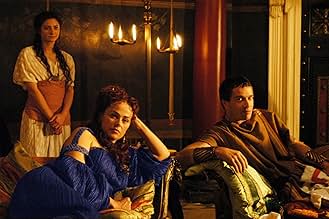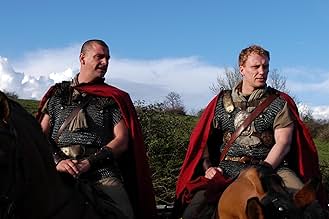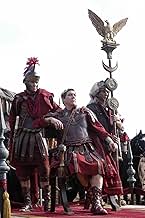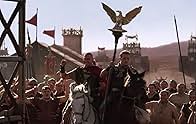The Stolen Eagle
- Episode aired Aug 28, 2005
- TV-MA
- 52m
In Gaul in 52 B.C., two Roman soldiers, Legionary Titus Pullo and Centurion Lucius Vorenus, are tasked with recovering Julius Caesar's personal Eagle, stolen from his camp in the dead of nig... Read allIn Gaul in 52 B.C., two Roman soldiers, Legionary Titus Pullo and Centurion Lucius Vorenus, are tasked with recovering Julius Caesar's personal Eagle, stolen from his camp in the dead of night. With his campaign in Gaul coming to a successful conclusion, Caesar's popularity is co... Read allIn Gaul in 52 B.C., two Roman soldiers, Legionary Titus Pullo and Centurion Lucius Vorenus, are tasked with recovering Julius Caesar's personal Eagle, stolen from his camp in the dead of night. With his campaign in Gaul coming to a successful conclusion, Caesar's popularity is continuing to grow.
- Castor
- (as Manfredi Aliquo')
- Directors
- Writer
- All cast & crew
- Production, box office & more at IMDbPro
Featured reviews
If you love depravity then watch it - if you want to be engaged watch the original 'Spartacus'...this is a waste.
The aspect of Rome that stood out the most were the sets. The art direction and attention to detail are magnificent.
While that is probably a bad thing; I have always respected television shows that feel they need to put money into sets and detail.
Judging by the pilot, the story that will run throughout the duration of the series will be the power struggle between Gaius Julius Caesar, and Gnaeus Pompeius Magnus.
Rome is governed equally between these two men. Ceaser has been away at war in Gaul for eight years and has gained popularity due to his success. Pompeius is threatened and jealous and wishes to throw Ceaser out of government. The struggle begins.
My biggest problem with the pilot is the dialogue. I found it extremely amateur, many lines were dull or cringe worthy.
However the pilot kept my attention and I will give Rome a few more episodes to improve.
If like me, you are a Roman history fanatic, you will find no other movie, TV or visual representation of any kind that even comes close to equaling the visual splendor, historical accuracy, and entertainment magnificence of HBO's 'Rome'. And this is my attempt to restrain my praise. I've watched and re-watched this entire series at least 5 times and intend to keep watching. I need my 'Rome' fix at least once per year.
But don't for a second think that the story holds less promise than the visual perfection. You cannot get a richer, more captivating true story than that of the life of Julius Caesar. The script writers went a step further and wove in the characters of Vorenus and Titus Pullo around whom the historical context revolves. And they are superb characters who, while fictionalized, are still based on real individuals mentioned in the writings of Caesar himself. The opening battle scene with Vorenus and Pullo on the front line mirrors quite closely what Caesar wrote about them in 'The Gallic War'.
The battle at the beginning was intense and brutal but too short and less bloody than in films like Braveheart. However I didn't mind its graphic violence level as it was more about covering the fundamental differences between the protagonists. One acted more like a happy drunken berserker, the other was more rational and responsible. In fact the contrast between them was also palpable in other elements. For example the dialogs weren't all black and white as they offered a second lecture to the careful viewers. One minute some character was defending the Republic, the next it was setting traps against it. In one scene it was also brilliant to use a young boy to lecture two veteran soldiers about what was really going on. So it wasn't just about the physical strength, it was also a lot about the mind, education and strategy. An other scene I really enjoyed was the one where the Eagle was actually stolen. It was dark, dynamic, unexpected and nearly mystic. In fact it wasn't the only one and a few others should surprise you as well. After all the astonishing opening credits revealed the Ancient Rome was a lot about rituals and myths. Let's also not forget the gorgeous women, gladiatorous men and other homages to Dionysus.
Then again, what was to be expected when The Stolen Eagle deals with the final stages of the Gallic Wars, the conflict that brought Julius Caesar (Ciaràn Hinds) to everlasting fame? The episode begins with the concluding battle between Romans and Gauls, one that gives Lucius Vorenus (Kevin McKidd) one more triumph to brag about when he returns home and sends the brutal, vulgar Titus Pullo (Ray Stevenson) to prison for insubordination. On the flip-side, Caesar learns his only daughter, Julia, died in childbirth, a fact that gets even worse considering her husband was Pompey (Kenneth Cranham), Caesar's political ally and friend, not to mention the only man capable of preventing the Senate from declaring the Roman conqueror a public enemy. The bad air generated by this set of events is already being felt in the great city, as Caesar's niece Atia (Polly Walker) already thinks of making new influential friends. When she isn't busy having sex with as many men as possible, that is.
It is that last element that caused controversy when Rome originally aired on BBC, alongside a few excessively violent bits. Not that flesh and blood are always bad: it just depends on how they are used within the series. In the case of HBO masterworks like The Sopranos, Six Feet Under and Deadwood, explicit sex and graphic blood-letting serve the story and add dramatic poignancy, whereas in Sex and the City, well it's just funny. In the first episode of Rome, however, it is hard to justify the full frontal nude scenes of Polly Walker, other wise terrific in her vicious portrayal of Atia, since they do nothing at all to move the story forward or establish her character (okay, maybe they are necessary in order to prove she is a slut, but there are better ways to achieve that goal). As for the violence, a similar remark is needed for the utterly gratuitous close-up of a decapitated bull, with blood flowing freely all over a young girl's body: that sequence has no narrative relevance at all, and constitutes nothing more than gore for its own sake. It also robs the key players of screen time they so richly deserve, especially Hinds, whose wounded yet powerful take on Caesar is the best celluloid incarnation of the character so far, and James Purefoy, gleefully malevolent as the scheming Mark Antony. McKidd and Stevenson make a convincing leading duo as well, although the first show doesn't give them many chances to interact properly.
Thankfully, the not-so-perfect storytelling in this debut hour is compensated by state-of-the-art visuals: the marvelous production design (all actual sets, based in Cinecittà, a famous studio located, fittingly enough, just outside Rome) and gorgeous costumes make the seductive looks of Gladiator seem amateurish, fully justifying the show's huge budget (some reports indicate it is the most expensive series ever produced as of 2007). With several feasts for the eye and an intriguing story to stimulate the mind, Rome is flawed (at least in the first half of the season) but also good enough to ensure viewers won't be annoyed, assuming the overblown carnage of early episodes doesn't strike them too hard in the gut.
Did you know
- TriviaAccording to history, Cato had long borne a grudge against Caesar for publicly embarrassing him. In brief, when they were both in the Senate, Cato spotted Caesar reading some correspondence while Cato was speaking, which was a pointed insult. Cato called on Caesar to read the letter aloud, which Caesar at first refused to do. Cato then invoked a public demand to hear the letter, whereupon Caesar read aloud an erotic love letter, which had been written by Cato's own half-sister, Servilia (one of Caesar's many lovers at the time). Cato never forgave Caesar for the insult.
- GoofsCato is portrayed as a very old man during the series and older then Julius Caesar. However, the historical Cato was at least five years younger then Julius Caesar.
- Quotes
Gaius Octavian: Be assured you will be amply rewarded for your services to me.
Titus Pullo: [to Vorenus] See how good he talks?
Lucius Vorenus: He's convincing, I'll give him that.
Gaius Octavian: Caesar will prove who I am. Take me to him.
Lucius Vorenus: We cannot do that as yet. We have orders.
Gaius Octavian: What orders?
Titus Pullo: We are to retrieve Caesar's stolen eagle.
Gaius Octavian: Caesar wouldn't pull a hair for his eagle. You're on a fool's errand.
Lucius Vorenus: If Caesar doesn't care about the eagle, why did he send us to find it?
Gaius Octavian: It would look strange if he made no efforts. Actually, losing the eagle is useful to Caesar.
Lucius Vorenus: Why would that be useful to Caesar?
Gaius Octavian: Because Pompey is no deep philosopher. He will take a symbolic loss for a real weakness.
Lucius Vorenus: Explain.
Gaius Octavian: Caesar doesn't want to strike the first blow against an old friend, so he wishes to lure Pompey into attacking him first. Pompey will only do this if he believes Caesar is weak.
Titus Pullo: No. They're as good as brothers, those two.
Gaius Octavian: When Julia died, the last true bond between them was cut. Caesar has taken the love of the common people from Pompey, and that was his most prized possession. A battle is inevitable.
- ConnectionsFeatured in WatchMojo: Top 10 Epic Television Battles (2017)
- SoundtracksRome Main Title Theme
(uncredited)
Written by Jeff Beal
Details
- Release date
- Countries of origin
- Official sites
- Language
- Filming locations
- Production companies
- See more company credits at IMDbPro





























